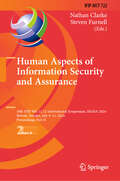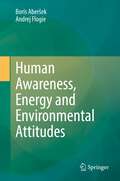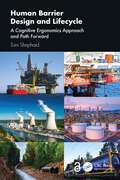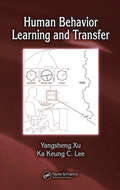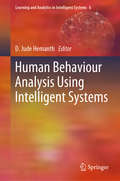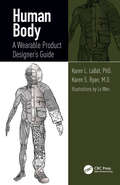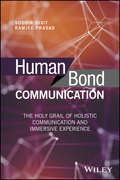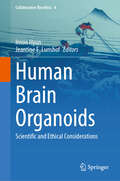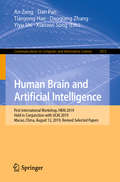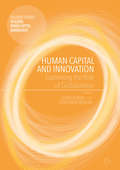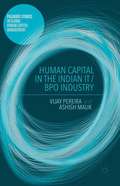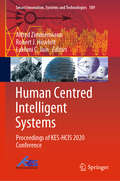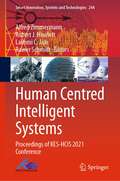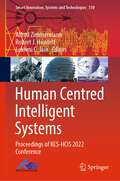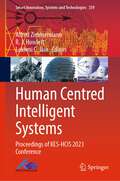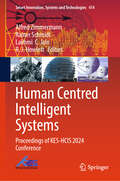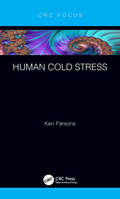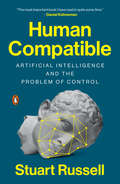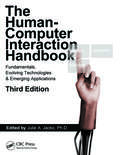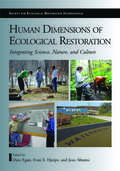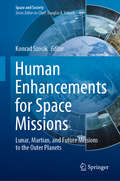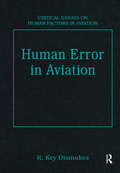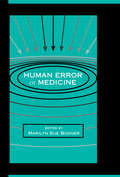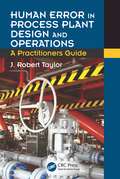- Table View
- List View
Human Aspects of Information Security and Assurance: 18th IFIP WG 11.12 International Symposium, HAISA 2024, Skövde, Sweden, July 9–11, 2024, Proceedings, Part II (IFIP Advances in Information and Communication Technology #722)
by Nathan Clarke Steven FurnellThe two-volume set IFIP AICT 721 +722 constitutes the proceedings of the 18th IFIP WG 11.12 International Symposium on Human Aspects of Information Security and Assurance, HAISA 2024, held in Skövde, Sweden, in July 9–11, 2024. The 39 full papers presented were carefully reviewed and selected from 55 submissions. The papers are organized in the following topical sections: Part I - Management and Risk; Social Engineering; Technical Attacks and Defenses; Usable Security. Part II - Awareness and Education; Privacy.
Human Awareness, Energy and Environmental Attitudes
by Boris Aberšek Andrej FlogieThis book raises awareness about environmental issues that result from energy production, extraction and conversion, and examines the attitudes people have about these issues. It discusses societal and educational relations associated with energy and environmental issues, focusing on philosophical, sociological and psychological views, and provides an analysis of how the individual and the society perceive, process and analyze the information on this subject. The authors present the concept of environmentally conscious engineering, discussing various forms of energy extraction and production, and detail alternative, under-researched and unaffordable solutions, such as nuclear fusion and artificial photosynthesis. The book also touches on topics such as the storage of energy and greenhouse gases, recycling and reuse of energy waste, and energy saving and efficiency. The book will be of interest to students and researchers of environmentally conscious engineering, energy use, and human dimensions of ecology and the environment, as well as NGOs, policy makers, and environmental activists.
Human Barrier Design and Lifecycle: A Cognitive Ergonomics Approach and Path Forward
by Tom ShephardA common source of failure in a human‑dependent barrier or safety critical task is a designed‑in mismatch error. The mismatch is a cognitive demand that exceeds the human capability to reliably and promptly respond to that demand given the plausible situations at that moment. Demand situations often include incomplete information, increased time pressures, and challenging environments. This book presents innovative solutions to reveal, prevent, and mitigate these and many other cognitive‑type errors in barriers and safety critical tasks. The comprehensive model and methodologies also provide insight into where and to what extent these barriers and task types may be significantly underspecified and the potential consequences.This title presents a new and comprehensive prototype design and lifecycle model specific to human‑dependent barriers and safety critical tasks. Designed to supplement current practice, the model is fully underpinned by cognitive ergonomics and cognitive science. The book also presents a compelling case for why a new global consensus standard specific to human‑dependent barriers is needed. Taking a novel approach, it presents its suggested basis, framing, and content. Both solutions seek to redress deficiencies in global regulations, standards, and practice. The model is guided by industry recommendations and best practice guidance and solutions from globally recognized experts. Its processes are fully explained and supported by examples, analysis, and well‑researched background materials. Real‑life case studies from offshore oil and gas, chemical manufacturing, transmission pipelines, and product storage provide further insight into how overt and latent design errors contributed to barrier degradation and failure and the consequence of those errors.An essential and fascinating read for professionals, Human Barrier Design and Lifecycle: A Cognitive Ergonomics Approach and Path Forward will appeal to those in the fields of human factors, process and technical safety, functional safety, display and safety system design, risk management, facility engineering, and facility operations and maintenance.Chapters 1 and 8 of this book are freely available as downloadable Open Access PDFs at http://www.taylorfrancis.com under a Creative Commons Attribution-Non Commercial-No Derivatives (CC-BYNC-ND) 4.0 International license.
Human Behavior Learning and Transfer
by Yangsheng Xu Ka Keung C. LeeBridging the gap between human-computer engineering and control engineering, Human Behavior Learning and Transfer delineates how to abstract human action and reaction skills into computational models. The authors include methods for modeling a variety of human action and reaction behaviors and explore processes for evaluating, optimizing, and trans
Human Behaviour Analysis Using Intelligent Systems (Learning and Analytics in Intelligent Systems #6)
by D. Jude HemanthHuman–computer interaction (HCI) is one of the most significant areas of computational intelligence. This book focuses on the human emotion analysis aspects of HCI, highlighting innovative methodologies for emotion analysis by machines/computers and their application areas. The methodologies are presented with numerical results to enable researchers to replicate the work. This multidisciplinary book is useful to researchers and academicians, as well as students wanting to pursue a career in computational intelligence. It can also be used as a handbook, reference book, and a textbook for short courses.
Human Body: A Wearable Product Designer's Guide
by Karen L. LaBat Karen S. RyanHuman Body: A Wearable Product Designer's Guide, unlike other anatomy books, is divided into sections pertinent to wearable product designers. Two introductory chapters include many definitions, an introduction to anatomical terminology, and brief discussions of the body's systems, setting the stage for the remaining chapters. The book is extensively referenced and has a large glossary with both anatomical and design terms making it maximally useful for interdisciplinary collaborative work. The book includes 200 original illustrations and many product examples to demonstrate relationships between wearable product components and anatomy. Exercises introduce useful anatomical, physiological, and biomechanical concepts and include design challenges. Features Includes body region chapters on head and neck, upper torso and arms, lower torso and legs, the mid-torso, hands, feet, and a chapter on the body as a whole Contains short sections on growth and development, pregnancy, and aging as well as sections on posture, gait, and designing total body garments Describes important regional muscles and their actions as well as joint range of motion (ROM) definitions and data with applications to designing motion into wearable products Presents appendices correlating to each body region’s anatomy with instructions for landmarking and measuring the body, a valuable resource for a lifetime of designing
Human Bond Communication: The Holy Grail of Holistic Communication and Immersive Experience
by Sudhir Dixit Ramjee PrasadThis book approaches the topic area of the Internet of Things (IoT) from the perspective of the five types of human communication. Through this perspective on the human communication types, the book aims to specifically address how IoT technologies can support humans and their endeavors. The book explores the fields of sensors, wireless, physiology, biology, wearables, and the Internet. This book is organized with five sections, each covering a central theme; Section 1: The basics of human bond communication Section 2: Relevance IoT, BAN and PAN Section 3: Applications of HBC Section 4: Security, Privacy and Regulatory Challenges Section 5: The Big Picture (Where do we go from here?)
Human Brain Organoids: Scientific and Ethical Considerations (Collaborative Bioethics #4)
by Insoo Hyun Jeantine E. LunshofBrain organoids are small stem cell-derived, self-organizing models of specific brain regions that offer researchers new ways to study the human brain. Since their scientific debut over ten years ago, brain organoids have been used to generate tractable new bioengineered tools for understanding functional interconnectivity of the human brain, dysfunction involved in many neurodegenerative diseases, and certain molecular mechanisms underlying cognition. Despite this field’s considerable scientific promise, advances in human brain organoid research also raise novel philosophical questions and ethical concerns around the use of complex human brain models and the ethical boundaries that should exist when manipulating increasingly realistic bioengineered brain constructs. As researchers generate more realistic organoids in vitro that resemble human brains, it is critically important to understand what ethical boundaries may exist and where researchers and regulators should draw the line for research, both to reduce uncertainties over which projects to pursue in the lab and to address future concerns regulators and the public may harbor about whether this research, if left unexamined, could inadvertently undermine public trust in science. This proposed book delves into ongoing and proactive ethical discussions among ethicists and the neuroscientists involved with this cutting-edge work. Its ultimate goal is to foster greater awareness, understanding, and guidance for future management of ethical issues that may be unique to new areas of brain organoid research. This volume is the result of a close partnership between ethicists and scientists, each informing the other through a collaborative process of joint bioethical deliberation.
Human Brain and Artificial Intelligence: First International Workshop, HBAI 2019, Held in Conjunction with IJCAI 2019, Macao, China, August 12, 2019, Revised Selected Papers (Communications in Computer and Information Science #1072)
by Daoqiang Zhang Tianyong Hao An Zeng Dan Pan Yiyu Shi Xiaowei SongThis book constitutes the refereed proceedings of the workshop held in conjunction with the 28th International Conference on Artificial Intelligence, IJCAI 2019, held in Macao, China, in August 2019: the First International Workshop on Human Brain and Artificial Intelligence, HBAI 2019. The 24 full papers presented were carefully reviewed and selected from 62 submissions. The papers are organized according to the following topical headings: computational brain science and its applications; brain-inspired artificial intelligence and its applications.
Human Capital and Innovation
by Sumit Kundu Surender MunjalThe second title in the Palgrave Studies in Global Human Capital Management series, this book explores how human capital contributes to innovation within the context of an inter-connected and globalized world. Investigating globalization as a phenomenon reflected within increasing cross-border flows of goods, services, know-how and talent, Human Capital and Innovation: Examining the Role of Globalization illustrates various facets of innovation at individual, team and organizational level. It highlights the influence of new economic realities, such as technological advances and the rise of emerging economies, on human capital and innovation.
Human Capital in the Indian IT/BPO Industry
by Vijay Pereira Ashish MalikHuman Capital in the Indian IT / BPO Industry analyses human capital management in the Indian information technology (IT) and business process outsourcing (BPO) industry, which has created a new paradigm for organising global talent engaged in designing and delivering IT and BPO services. The authors explore the evolution of the innovative talent management strategies of knowledge workers, which has received little attention in existing literature analysis. This book provides a rich theoretical grounding of managing human resources in the context of high-technology professional services firms, focusing on the design and implementation of high performance work system designs in the context of Indian IT/BPO organizations.
Human Centred Intelligent Systems: Proceedings of KES-HCIS 2020 Conference (Smart Innovation, Systems and Technologies #189)
by Lakhmi C. Jain Robert J. Howlett Alfred ZimmermannThis book highlights new trends and challenges in intelligent systems, which play an important part in the digital transformation of many areas of science and practice. It includes papers offering a deeper understanding of the human-centred perspective on artificial intelligence, of intelligent value co-creation, ethics, value-oriented digital models, transparency, and intelligent digital architectures and engineering to support digital services and intelligent systems, the transformation of structures in digital businesses and intelligent systems based on human practices, as well as the study of interaction and the co-adaptation of humans and systems. All papers were originally presented at the International KES Conference on Human Centred Intelligent Systems 2020 (KES HCIS 2020), held on June 17–19, 2020, in Split, Croatia.
Human Centred Intelligent Systems: Proceedings of KES-HCIS 2021 Conference (Smart Innovation, Systems and Technologies #244)
by Lakhmi C. Jain Robert J. Howlett Rainer Schmidt Alfred ZimmermannThis book highlights new trends and challenges in intelligent systems, which play an essential part in the digital transformation of many areas of science and practice. It includes papers offering a deeper understanding of the human-centred perspective on artificial intelligence, of intelligent value co-creation, ethics, value-oriented digital models, transparency, and intelligent digital architectures and engineering to support digital services and intelligent systems, the transformation of structures in digital business and intelligent systems based on human practices, as well as the study of interaction and co-adaptation of humans and systems. All papers were originally presented at the International KES Conference on Human Centred Intelligent Systems 2021 (KES HCIS 2021) held on June 14–16, 2021 in the KES Virtual Conference Centre.
Human Centred Intelligent Systems: Proceedings of KES-HCIS 2022 Conference (Smart Innovation, Systems and Technologies #310)
by Lakhmi C. Jain Robert J. Howlett Alfred ZimmermannThe volume includes papers presented at the International KES Conference on Human Centred Intelligent Systems 2022 (KES HCIS 2022), held in Rhodes, Greece on June 20–22, 2022. This book highlights new trends and challenges in intelligent systems, which play an important part in the digital transformation of many areas of science and practice. It includes papers offering a deeper understanding of the human-centred perspective on artificial intelligence, of intelligent value co-creation, ethics, value-oriented digital models, transparency, and intelligent digital architectures and engineering to support digital services and intelligent systems, the transformation of structures in digital businesses and intelligent systems based on human practices, as well as the study of interaction and the co-adaptation of humans and systems.
Human Centred Intelligent Systems: Proceedings of KES-HCIS 2023 Conference (Smart Innovation, Systems and Technologies #359)
by Lakhmi C. Jain Alfred Zimmermann R. J. HowlettThe volume includes papers presented at the International KES Conference on Human Centred Intelligent Systems 2023 (KES HCIS 2023), held in Rome, Italy on June 14–16, 2023. This book highlights new trends and challenges in intelligent systems, which play an important part in the digital transformation of many areas of science and practice. It includes papers offering a deeper understanding of the human-centred perspective on artificial intelligence, of intelligent value co-creation, ethics, value-oriented digital models, transparency, and intelligent digital architectures and engineering to support digital services and intelligent systems, the transformation of structures in digital businesses and intelligent systems based on human practices, as well as the study of interaction and the co-adaptation of humans and systems.
Human Centred Intelligent Systems: Proceedings of KES-HCIS 2024 Conference (Smart Innovation, Systems and Technologies #414)
by Lakhmi C. Jain Rainer Schmidt Alfred Zimmermann R. J. HowlettThe volume includes papers presented at the International KES Conference on Human Centred Intelligent Systems 2024 (KES HCIS 2024), held in Madeira, Portugal on June 19–21, 2024. This book highlights new trends and challenges in intelligent systems, which play an important part in the digital transformation of many areas of science and practice. It includes papers offering a deeper understanding of the human-centred perspective on artificial intelligence, of intelligent value co-creation, ethics, value-oriented digital models, transparency, and intelligent digital architectures and engineering to support digital services and intelligent systems, the transformation of structures in digital businesses and intelligent systems based on human practices, as well as the study of interaction and the co-adaptation of humans and systems.
Human Cold Stress
by Ken ParsonsThis book provides an up-to-date, accessible, and comprehensive coverage of human cold stress from principles and theory to practical application. It defines cold stress and how people respond to it. It describes how to assess a cold environment to predict when discomfort, wind-chill, hypothermia, shivering, frostbite, and other consequences will occur. It also advises on what to do to prevent unacceptable outcomes, including determination and selection of clothing to preserve comfort and health. The book will be of interest to practitioners and students and anyone involved with fields such as textiles, clothing, and industrial hygiene.
Human Compatible: Artificial Intelligence and the Problem of Control
by Stuart Russell"The most important book I have read in quite some time" (Daniel Kahneman); "A must-read" (Max Tegmark); "The book we've all been waiting for" (Sam Harris)A leading artificial intelligence researcher lays out a new approach to AI that will enable us to coexist successfully with increasingly intelligent machinesLonglisted for the 2019 Financial Times/McKinsey Business Book of the Year AwardIn the popular imagination, superhuman artificial intelligence is an approaching tidal wave that threatens not just jobs and human relationships, but civilization itself. Conflict between humans and machines is seen as inevitable and its outcome all too predictable. In this groundbreaking book, distinguished AI researcher Stuart Russell argues that this scenario can be avoided, but only if we rethink AI from the ground up. Russell begins by exploring the idea of intelligence in humans and in machines. He describes the near-term benefits we can expect, from intelligent personal assistants to vastly accelerated scientific research, and outlines the AI breakthroughs that still have to happen before we reach superhuman AI. He also spells out the ways humans are already finding to misuse AI, from lethal autonomous weapons to viral sabotage. If the predicted breakthroughs occur and superhuman AI emerges, we will have created entities far more powerful than ourselves. How can we ensure they never, ever, have power over us? Russell suggests that we can rebuild AI on a new foundation, according to which machines are designed to be inherently uncertain about the human preferences they are required to satisfy. Such machines would be humble, altruistic, and committed to pursue our objectives, not theirs. This new foundation would allow us to create machines that are provably deferential and provably beneficial.In a 2014 editorial co-authored with Stephen Hawking, Russell wrote, "Success in creating AI would be the biggest event in human history. Unfortunately, it might also be the last." Solving the problem of control over AI is not just possible; it is the key that unlocks a future of unlimited promise.
Human Computer Interaction Handbook: Fundamentals, Evolving Technologies, and Emerging Applications, Third Edition (Human Factors and Ergonomics)
by Julie A. JackoWinner of a 2013 CHOICE Outstanding Academic Title Award The third edition of a groundbreaking reference, The Human-Computer Interaction Handbook: Fundamentals, Evolving Technologies, and Emerging Applications raises the bar for handbooks in this field. It is the largest, most complete compilation of HCI theories, principles, advances, case st
Human Dimensions of Ecological Restoration: Integrating Science, Nature, and Culture (Science Practice Ecological Restoration)
by Jesse Abrams Evan E. Hjerpe Dave EganHuman Dimensions of Ecological Restoration takes an interdisciplinary look at the myriad human aspects of ecological restoration. In twenty-six chapters written by experts from around the world, it provides practical and theoretical information, analysis, models, and guidelines for optimizing human involvement in ecological restoration projects. The book delves into the often-neglected aspects of ecological restoration that ultimately make the difference between projects that are successfully executed and maintaned with the support of informed, engaged citizens, and those that are unable to advance past the conceptual stage due to misunderstandings or apathy. The lessons contained will be valuable to restoration veterans and greenhorns alike, scholars and students in a range of fields, and individuals who care about restoring their local lands and waters.
Human Dimensions of Wildlife Management in Japan: From Asia to the World (Ecological Research Monographs)
by Ryo SakuraiThis book discusses the findings of research on the human dimensions of wildlife management conducted in Japan, demonstrating how such research and approaches have contributed to mitigating human-wildlife conflicts.Human-wildlife conflicts, including agricultural and property damage as well as occasional casualties, are a global problem for which local residents, managers, and stakeholders around the world are struggling to find solutions. Human dimensions of wildlife management (HDW) is an academic field developed in North America in the 1970s to gather information on the social aspects of human-wildlife issues to help wildlife managers and stakeholders implement effective decision-making measures. However, HDW is not widely recognized or applied outside North America, and few studies have investigated whether HDW approaches would be effective in different cultural settings.This is the first book written in English to introduce the HDW theories and practices implemented in Asia. Presenting innovative approaches and research techniques, as well as tips on how to introduce HDW methods into culturally different societies, it is a valuable resource not only for researchers and students in this field, but also for government officials/managers, NGOs, residents and other stakeholders who are affected by human-wildlife conflicts around the globe.
Human Enhancements for Space Missions: Lunar, Martian, and Future Missions to the Outer Planets (Space and Society)
by Konrad SzocikThis book presents a collection of chapters, which address various contexts and challenges of the idea of human enhancement for the purposes of human space missions. The authors discuss pros and cons of mostly biological enhancement of human astronauts operating in hostile space environments, but also ethical and theological aspects are addressed. In contrast to the idea and program of human enhancement on Earth, human enhancement in space is considered a serious and necessary option. This book aims at scholars in the following fields: ethics and philosophy, space policy, public policy, as well as biologists and psychologists.
Human Error in Aviation (Critical Essays On Human Factors In Aviation Ser.)
by R. Key DismukesMost aviation accidents are attributed to human error, pilot error especially. Human error also greatly effects productivity and profitability. In his overview of this collection of papers, the editor points out that these facts are often misinterpreted as evidence of deficiency on the part of operators involved in accidents. Human factors research reveals a more accurate and useful perspective: The errors made by skilled human operators - such as pilots, controllers, and mechanics - are not root causes but symptoms of the way industry operates. The papers selected for this volume have strongly influenced modern thinking about why skilled experts make errors and how to make aviation error resilient.
Human Error in Medicine (Human Error and Safety)
by Marilyn Sue BognerThis edited collection of articles addresses aspects of medical care in which human error is associated with unanticipated adverse outcomes. For the purposes of this book, human error encompasses mismanagement of medical care due to: * inadequacies or ambiguity in the design of a medical device or institutional setting for the delivery of medical care; * inappropriate responses to antagonistic environmental conditions such as crowding and excessive clutter in institutional settings, extremes in weather, or lack of power and water in a home or field setting; * cognitive errors of omission and commission precipitated by inadequate information and/or situational factors -- stress, fatigue, excessive cognitive workload. The first to address the subject of human error in medicine, this book considers the topic from a problem oriented, systems perspective; that is, human error is considered not as the source of the problem, but as a flag indicating that a problem exists. The focus is on the identification of the factors within the system in which an error occurs that contribute to the problem of human error. As those factors are identified, efforts to alleviate them can be instituted and reduce the likelihood of error in medical care. Human error occurs in all aspects of human activity and can have particularly grave consequences when it occurs in medicine. Nearly everyone at some point in life will be the recipient of medical care and has the possibility of experiencing the consequences of medical error. The consideration of human error in medicine is important because of the number of people that are affected, the problems incurred by such error, and the societal impact of such problems. The cost of those consequences to the individuals involved in medical error, both in the health care providers' concern and the patients' emotional and physical pain, the cost of care to alleviate the consequences of the error, and the cost to society in dollars and in lost personal contributions, mandates consideration of ways to reduce the likelihood of human error in medicine. The chapters were written by leaders in a variety of fields, including psychology, medicine, engineering, cognitive science, human factors, gerontology, and nursing. Their experience was gained through actual hands-on provision of medical care and/or research into factors contributing to error in such care. Because of the experience of the chapter authors, their systematic consideration of the issues in this book affords the reader an insightful, applied approach to human error in medicine -- an approach fortified by academic discipline.
Human Error in Process Plant Design and Operations: A Practitioner's Guide
by J. Robert TaylorIn contrast to nuclear plants and aerospace systems, human error is largely ignored in quantitative risk assessment for petroleum and chemical plants. Because of this, current risk analysis methods are able to calculate and predict only about one-third of the accidents happening in practice. Human Error in Process Plant Design and Operations: A Pra
